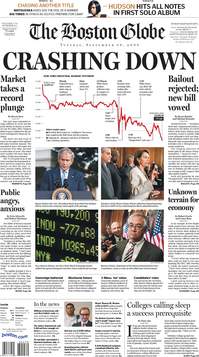
Unknown terrain for economy
By Robert Gavin and Casey Ross, Globe Staff | September 30, 2008
In an example of how fragile credit markets have become, the state of Massachusetts yesterday tried to borrow $400 million to make its routine quarterly local aid payments to cities and towns. State treasury officials said the credit markets abruptly froze midday, leaving them $170 million short. The state will have to use its own funds to complete the local aid payments, draining the state's balance to extremely low levels.
"I don't think any treasurer alive could say they've ever seen anything like this," said Timothy P. Cahill, the state's treasurer. "There have always been cash shortages, but you could always go to the market and get more. This is the first time we haven't been able to do that."
Cahill said he believes the credit market will in effect remain shuttered today as the nation's largest lenders hold on to their cash amid uncertainty over plans for a federal bailout. In short, the House's rejection of a $700 billion Wall Street bailout plan takes Massachusetts and the rest of the US economy into territory that few policy makers and analysts wanted to explore.
It tests the forecasts of Federal Reserve chairman Ben Bernanke and Treasury Secretary Henry Paulson that failure to approve the plan will dry up credit markets, damage the financial system, and send the fragile US economy spiraling into a deep recession. The economy may yet muddle through, analysts said, but the risks of a catastrophic downturn have risen.
"We're in a recession now, and the numbers show the recession deepening," said Lyle Gramley, a former Federal Reserve governor and senior economic adviser for national financial services firm Stanford Group. "If it doesn't turn around soon, we're heading for the worst recession" of the post-World War II era.
The federal bailout proposal called for the government to spend up to $700 billion to buy mortgage-based securities and other holdings from financial firms. The idea is to boost confidence in those companies by taking the troubled investments, whose values have been sapped by the subprime mortgage market meltdown, off their books. Banks and other financial firms have stopped lending money to one another, afraid that their counterparts may have large holdings of such mortgage-backed assets, and could be in the same danger that caused firms such as Lehman Brothers to file for bankruptcy.
"These markets have to be stabilized somehow, " said Eugene White, economics professor at Rutgers University. "If we get into a downward spiral of credit tightening, more people will lose jobs, they'll stop buying goods and services, and we're in a recession that will be hard to get out of."
White said the collapse of the financial system and the subsequent drying up of credit created such a spiral in the early 1930s, turning the economic downturn into the Great Depression. He said the House's failure to act could be compared to the Fed of that period, which largely stood on the sidelines during a wave of bank failures. "We need government to come in and take decisive action," White said.
Several large financial firms have collapsed in recent weeks, including Lehman Brothers, which filed for bankruptcy, and Washington Mutual, the national savings and loan bank seized by regulators. Insurance giant American International Group and mortgage giants Fannie Mae and Freddie Mac were taken over by the federal government before they, too, collapsed and possibly pulled down the broader financial system.
The situation, however, is nowhere near as bad as in the 1930s, in large part because the Federal Reserve today has acted aggressively, analysts said. The Fed has cut interest rates by more than 3 percentage points in a little more than a year, and, working with other central banks, pumped hundreds of billions of dollars into credit markets to keep the global financial system operating. Yesterday, the Fed and foreign central banks acted to pump hundreds of billions more into the financial system.
The rejection of the bailout package leaves the Fed on its own, analysts said. After rushing to prevent the collapse of firms such as AIG and Freddie and Fannie, and combating panic across global markets, Fed officials and the Bush administration sought the bailout as a comprehensive approach to shore up the financial system.
William Niskanen, an economist at Cato Institute, a libertarian think tank in Washington, said a case-by-case approach would be best. He said some large financial institutions might yet fail, but ultimately the economy needs to work out the excesses of the housing and credit bubbles without massive government intervention.
The Fed, however, can still help the economy avoid a deep downturn by aggressively cutting interest rates, said Brian Bethune, an economist at Global Insight, a Waltham forecasting firm. Lower interest rates encourage businesses and consumers to borrow and spend, which boosts economic activity.
Bethune said the Fed needs to cut its key interest rate, which now stands at a historically low 2 percent, by half or three-quarters of a percentage point. It could provide an additional boost by coordinating its rate cuts with foreign central banks.
"This puts the onus on the Fed," Bethune said. "The game isn't over, but it's halftime and we're down three touchdowns."
Robert Gavin can be reached at rgavin@globe.com, Casey Ross can be reached at cross@globe.com.
No comments:
Post a Comment
Note: Only a member of this blog may post a comment.